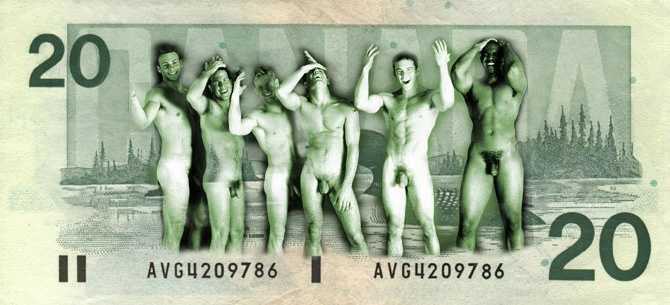

WHAT IS THIS "PINK RAND" ALL ABOUT?

If this is what "pink money" is all about, I'm all for it!
Following a line of thought which started
in another discussion, revolving around gay rip-offs, I have been thinking of
late about this nebulous "pink rand" which everyone seems to think
that we can wave like a magic wand and have straight society take notice of us.
What is this "pink rand"? Gay
activists tell us that it is a powerful weapon to use against straight society.
How, I ask? I look at my monthly expenses, and find that most of my money goes
to exactly the same places as straight money goes – the supermarket, petrol
purchases, chainstore accounts and the taxman. In the marketplace I am a
consumer first, and a gay man second, and nary do the twain mix.
We are exhorted to spend our money where
gay people are appreciated. Indeed? So where are these gay supermarkets, garages
(???) and chainstores which I am supposed to patronise? Does Pick ‘n Pay make
any distinction between the "pink" rand and the "black",
"coloured", "Indian" and "female" rand? The very
thought is ridiculous. We are customers, in all our diversity, and who we sleep
with does not enter the equation, regardless of what we are told.
This leads one to wonder why this lie is
propagated? This lie which tries to make us as gay people believe that we are
"better" than straights, and that we can make a difference to the
economy of the country. Statistics are used to argue the point. They use the
yardstick that 10% of the population is gay (although this is questionable, as
we are applying a western yardstick to an African society), which in South
Africa amounts to about 4 million people. How many of those 4 million people
live in the "why is there so much month left at the end of the money"
syndrome? We live in a country where the majority of gay people are NOT wealthy,
with large disposable incomes, as the case put forward in western democracies.
Gay people in South Africa do NOT earn more than their straight counterparts.
Making ends meet is the reality of most South Africans, both straight and gay.
And so, even if there were gay supermarkets, et al, as consumers gay
people would still shop where they get the best value for money – regardless
of who owns them.
Perhaps the most ridiculous argument put
forward is the famous "Coors Beer" boycott in the United States. In
the first place, to get proponents of this argument to quote another incident of
the "power of the pink dollar" results in stony silence. One swallow
does not a summer make. Secondly, even if it was successful in the United
States, where organised gay life is light years ahead of South Africa, that
doesn’t mean it proves anything in this country. For me to believe in the
benefit and power of the pink rand, I’d like to see a South African example of
how it has worked to our benefit. It’s like saying petrol is cheaper in the
United States. What does that mean to us, here? Nothing.
This leads us to the next issue which the
"pink rand" devotees promote. "SHOP AT GAY STORES – KEEP YOUR
MONEY WITHIN THE COMMUNITY".
Well, when last did you shop at a
"gay store"? And what was your experience there? Firstly, gay-owned
businesses are outrageously overpriced. Typically gay businesses mark up their
prices on the premise that one "has to pay for quality" – as if
quality isn’t available anywhere else! They don’t seem to realise that
whatever they are selling, it can be obtained elsewhere. (I am talking here of
retailers, not producers of original goods). So the question is, why should I be
ripped off by other moffies just to support the gay community (whatever that
may be)? Where is my discount as a gay man – where is my support
as a customer of these businesses? Why is it that when my money is
concerned I am the only one supposed to make sacrifices?
And then, after the ridiculous prices, the
service one has to put up with in ‘gay-owned’ businesses is abysmal. South
Africa is renowned for being a country of bad service, but a large number of gay
businesses take this bad service to new depths.
The queen sitting behind the counter
usually suffers from delusions of grandeur. Normally as Hilda as sin, he thinks
that he is a runner-up in the Miss SA pageant, and has such an inflated
self-opinion that the impression one gets is that he is doing you a moer
of a favour to serve you. He has never come to terms with the fact that he is
just another counter hand, and not Princess Margaret.
Thus, offering only condescension and
ridiculous prices, why should I spend the my ‘pink rands’ at gay businesses?
Value for money is what counts, not some nebulous sense of solidarity with gay
people whom I don’t know. I want value for money. And when gay-owned
businesses can offer me that, then perhaps I’ll support them. My support will
be determined by their competitiveness, not by their sexual orientation.
In the final analysis, one wonders if this
‘pink rand’ thing isn’t just another way of trying to validate our
existence? Isn’t it just a way of making us believe that we really do mean
something? Why are we so desperate to prove to ourselves that we are special? Do
we have such large inferiority complexes?
©
April 2000 Ken Cage